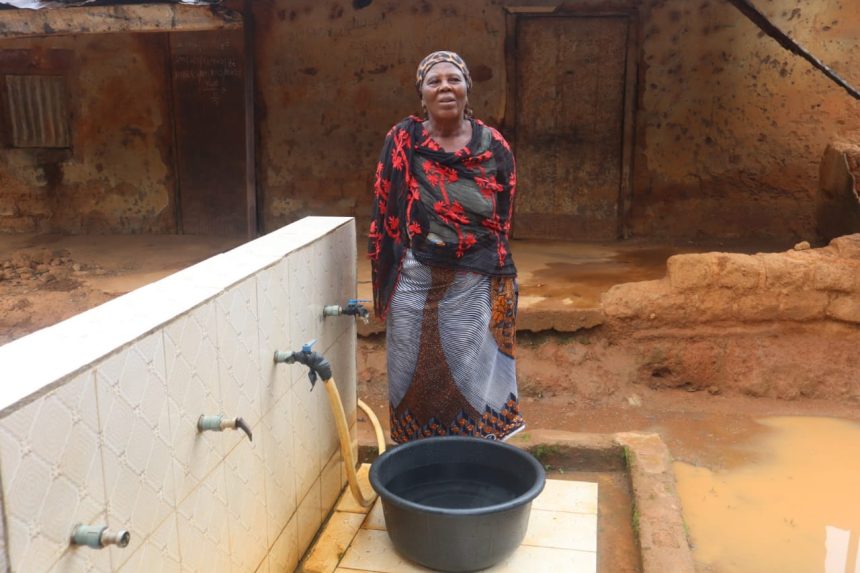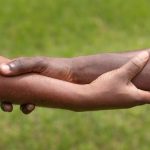Difficulty in accessing safe and clean drinking water has forced most communities to share streams with animals. ‘Pushed to Action’ is a three-part series exploring how locals in far-flung communities are improving easy access to safe drinking water.
One cold evening in May 2023, Hannatu Birtrus carried a black empty bowl and walked a few metres to the community borehole to get water. Soon she was back and began preparations for the day.
But it has not always been this easy for residents of Kanja, in Nigeria’s Northcentral Nasarawa State; Birtrus and the about 2500 residents in her village often walked long distances to fetch water from three streams at three different ends of the village.
Also, the water could have been cleaner, for they shared the streams with animals, including cows, pigs and goats.
According to Birtrus, these animals swim and leave their faeces in this stream that the community depended on for cooking and drinking water.
This lack of water, sanitation and hygiene services is not unique to Kanja. Globally, according to the World Health Organization or WHO, at least two billion people use a drinking water source contaminated with faeces, which poses the most significant risk to drinking water safety. Contaminated water and poor sanitation are linked to the transmission of diseases such as cholera, diarrhoea, dysentery, hepatitis A, typhoid and polio.
And since women and girls are mostly responsible for collecting water, the United Nations Children’s Fund or UNICEF said the 200 hours they spend doing this each day is “a colossal waste of their valuable time.” In sub-Saharan Africa, for instance, one roundtrip to collect water is 33 minutes on average in rural areas and 25 minutes in urban areas.
“A lot of difference”
Although the Kanja community once had a manual borehole provided by the government six years ago, it developed a fault and was abandoned.
Birtrus Shammah, the ward head in Kanja, said the community met their local government chairman and councillor several times but had no positive response.
“They will come here, promise us, and we won’t see them. We have talked to the councillor several times but nothing,” the 68-year-old said.
This led Uwayi Shammah, a community member who grew up with the lack of water in her village, to save up part of her National Youth Service Corps allowance and to mobilise support from individuals outside her community to provide a borehole for them. The donation was also enough to get a generating set, as the community has not had public power since the 1940s.
To fuel the generating set and maintain it, however, community members had a series of meetings and agreed to pay N50 ($0.06) each time they wanted to collect water.
“Sincerely, we want to thank God for this borehole,” Bitrus said. “I fetch water like three times a day because we use water to work [wash, clean, and cook].”
He added that “This borehole makes a lot of difference,” adds Shammah, who collects the money paid by residents. “We are not going to streams again like before, and we are enjoying clean water.”
Just like in Kanja, residents of Akakwu, a village in Nigeria’s Southeastern Enugu State, struggled with getting clean drinking water.
Given the hilly topography of the area, residents like Bartholomew Chukwueze often walked long distances up a hill to collect water from a spring, the only source of water available to the people.
Because of the distance, Chuwueze barely gets enough water needed by his wife to cook, clean, and wash.
“If you are going up the hill to get water, you would have to spend about an hour to and fro and to get 25 jerry cans of water, that means one has to climb the hill about 13 times carrying two jerry cans each time. Since it was difficult to do that, [the women] had to manage whatever quantity we gave to them,” Chukwueze said.
It gets worse during the dry season when the spring becomes almost dried up. “[That time] we would leave the house as early as 5 am for the hill and return home around 5 pm because there would be so many people queuing up and scrambling for water from the spring,” Onyinyechi Ugwu,* a teenager in the community said.
Ugwu added that girls and women bear the brunt of the water scarcity. She explained that women menstruate for between two to seven days every month, and for good menstrual hygiene, they need to bathe frequently and wash their hands after changing sanitary towels, but that is not the case as girls in the community are forced to manage any water they get.
And the implication is grave. According to the World Bank, a lack of access to menstrual hygiene management exposes women and girls to reproductive and urinary tract infections.
For girls and women in Akakwu, that didn’t matter, “Knowing how stressful it was to get water [from the hill], it did not matter whether or not a girl was on her period, she just had to manage water,” Ugwu said.
But things changed in 2020 after the Nigerian government began a borehole intervention project in Akakwu, a result of several calls, including writing letters to their political representatives.
When the project started, community members volunteered their skills and manpower to support the project, which was completed in early 2022.
Part of the project is the provision of a generating set to cover the lack of power supply. Before collecting water from the borehole, residents pay N20 ($0.02) for a 25 litres jerry can, and families in the village take turns selling the water each time the tank is filled.
The money realised from the sales is used to purchase diesel to power the generator and pump water to fill the metallic tank. This borehole serves over 2000 residents of Akakwu village.
Now that there is a borehole, Chukwueze said he is now able to access clean water for his wife and one-month-old daughter.
“I am thankful that the borehole came to our village because I no longer climb the hill or worry about the spring drying up,” Chukwueze said. “I can also easily fetch as much water as needed for my wife and baby from the borehole; that would not have been possible if I had to rely on just the spring.”
“I still go to the stream.”
Despite the availability of clean borehole water in both communities, not every resident can pay the fee to fetch the water, thus forcing them to resort to their old sources of water.
In Kanja, 42-year-old Laraba Danladi said, “I come [to the borehole] two times a week to collect water, and I still go to the stream when I don’t have money.” She adds.
In Akakwu, the borehole installed has one water tank that serves over 2000 people. This makes the tank run out of water quickly.
“The borehole is not enough because you have the entire population depending on one water tank. More boreholes should be built to adequately serve the water needs of the village,” said Joseph Okoro, a 64-year-old indigene and resident of Akakwu village.
Although Birtrus acknowledged that the borehole in her community is helping the people, she hopes there will be more boreholes constructed to serve the community better.
“We are praying for more because the water does not reach the entire village. We don’t want to have malaria again,” Birtrus said.
*Not her real name
This story was produced with the support of Nigeria Health Watch through the Solutions Journalism Network, a nonprofit organisation dedicated to rigorous and compelling reporting about responses to social problems.





